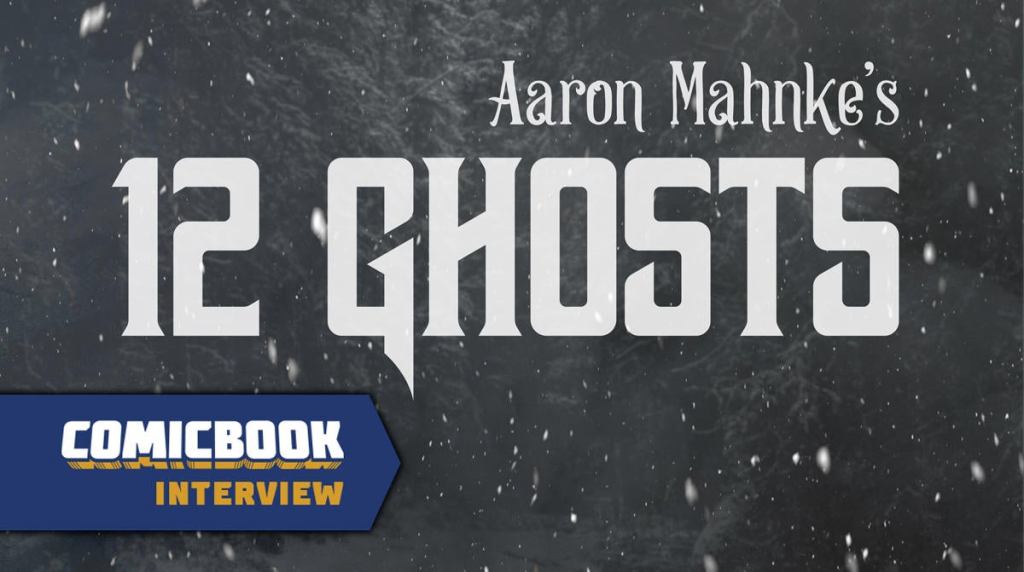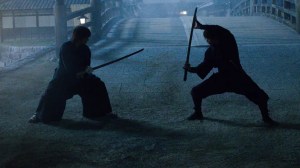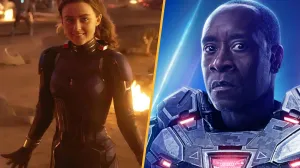In the months leading towards Halloween, horror fans have a plethora of ghost stories to dive deep into, but once the temperatures start dropping and snow begins falling, there’s a strong embrace of things that are holly and jolly. Luckily, for those in search of creepy experiences that hearken back to the time-honored traditions of reflecting on years past, iHeartMedia has today debuted the first episode of 12 Ghosts, an all-new podcast series from Lore creator Aaron Mahnke and writer Nick Tecosky. Counting down the 12 days of Christmas, the podcast series will unveil an all-new eerie episode each day, exploring all manner of stories featuring spirits from the past, and featuring the voice of genre icon Malcolm McDowell. You can head to the official 12 Ghosts website now to listen to the first episode.
Videos by ComicBook.com
The new series is described, “In the midst of a massive blizzard, 11 strangers find themselves stranded in an old inn on Christmas Eve. With no escape, and strangely compelled by the old innkeeper (Malcolm McDowell), each stranger discovers something they have in common: everyone has a secret spectral tale. Produced in 3D binaural sound, listeners will be transported to Mulligan’s Inn as they follow each storyteller into their nightmares and experience a timeless, frightening tale.”
ComicBook.com caught up with Mahnke and Tecosky to talk about the origins of the new series, time-honored traditions, and unconventional explorations of the holiday season.

Unlikely Traditions
ComicBook.com: Some of my holiday traditions are watching horror movies like Black Christmas or Silent Night, Deadly Night. It doesn’t necessarily have to be a horror movie or horror story, but do you have unconventional holiday traditions that people would wonder why you’d make it a tradition, but you can’t celebrate the holidays without it?
Aaron Mahnke: I don’t know that I have anything that’s really out of the ordinary. We’re a “Die Hard is a Christmas movie” family and that’s something that sometimes gets people scratching their heads if they’re not on board with that, or they’ve never heard that debate. There’s that aspect of it. For me, honestly, Christmastime is when I get to take a little bit of a break. I work pretty much year-round, so that week between Christmas and New Year’s, for me, it feels like a time I get to sit down with a stack of comic books or books or new novels that came out and just plow through them. So that’s where my entertainment comes in.
Nick Tecosky: Die Hard, absolutely, is one of our regular Christmas movies. My wife and I watch a lot of them, she’s a huge fan of all movies that are Christmas. Recently, Krampus has been a thing that we kick the holiday season off with. I like the comedy of it as well as the horror. It’s nice to see bad people learning to be better, even if they’re trapped in a pocket dimension for the rest of existence.
I love [Krampus director] Mike Dougherty, he has such an awareness of balancing the fantastical with the traditions with humor with horror.
Tecosky: There was a show that used to go on yearly here in Atlanta, it was a Krampus Christmas, and it was basically a bunch of metal and people just putting on the most bawdy show. I did it a few years ago, I played stoned Jesus, and Jesus kept getting murdered on stage and then resurrecting and coming back out. So it was a lot of fun and I guess that wasn’t a typical holiday.
Evolution of Festivities
What I like about Christmas and holidays and holiday movies and stories and TV shows, in general, is the diverse ways in which those things are honored and with this series, sure, it’s called 12 Ghosts, some of them are a bit more horror, some are a bit more dramatic, some are a bit more touching. How did you find that balance of capturing the “spirit” of the holiday, the spirit of this podcast, and if there was any challenge of, “This is going too horror,” or, “This is not horror enough, maybe a little too Hallmark Christmas,”?
Mahnke: One thing that we have to address before we even dig into the show, though, is the underlying concept that you’re talking about, which is that there is a “Christmasy” mood or tone. What we know of as today’s Christmas mood and tone, peace on Earth, good will toward men, all those things, they’re a relatively modern idea. And by that, I mean Victorian age, mid-1800s.
For centuries, probably many hundreds of years, there were a lot of pre-Christian things that came into the end-of-the-year celebrations. The idea of a yule log, that is a pre-Christian idea. What a lot of folks call Pagan. A lot of them involve sitting around the fire on the darkest day of the year and sharing stories. As people are want to do, they share spooky stories. And for a really long time, there were a lot of end-of-year ghost stories. As Christianity merged in with that, they married some of their pieces together. The ghost stories continued well into the 1600s and then the English Civil War broke out and it was between, essentially, people who wanted to maintain this high-church, Catholic feel for Christianity and people who wanted to go ultra-extreme, ultra-conversative, strip away all the fun, take it down to its bare bones, and a lot of it had to do with making it look as anti-Catholic as possible. So that was the Puritans, the folks who came over on the Mayflower and founded the Commonwealth of Massachusetts, all that stuff.
Oliver Cromwell takes over after the English Civil War, you have this Puritan-run government and they outlaw the celebration of Christmas. And with that, the outline of the feasts, they have soldiers roaming the streets and if they smelled fest food being made for the festival at wintertime, they would just be able to take that and run with it. They could steal your food and go. They were all about killing the fun. They got rid of other things, too, they got rid of Eastertide and Pentecost and things that they saw as high-church celebrations, but Christmas got the boot. So when the pilgrims came over to America and settled, there was a good, I don’t know, 12 or 13 years there where it was really illegal to have any Christmas celebrations.
When it came back, it came back slowly and with trepidation. They were slowly working things back in, and at the same time, society was growing, we were developing. We hit the Industrial Revolution and the Industrial Revolution had this effect of — well there were positives: We lowered the cost of goods, more people could get important things, but at the same time we lost a bit of connection to who we are as people and what we make, our place in community. Charles Dickens was writing and A Christmas Carol was sort of the first time that he really started penning this anti-capitalism response to the Industrial Revolution, like, “Let’s go back to a simpler time,” and that’s why you’ve got Scrooge as what we now think of as the typical Christmas spirit. The “good will towards all,” peace and love and forgiveness and redemption. Dickens brought those into the Christmas season. He even created Father Christmas, brought these in as a response to almost the sanitized, sterilized, Industrial Revolution world we lived in, and when he did that, and doing all that, “Let’s bring it all back,” he brought ghost stories into the picture, which was this ultimate restoration. We had all these ancient ghost stories, let’s bring back ghosts and chains and wailing and trippy visions of the past and the future, it’s so cool.
I guess that’s my diatribe to say, we talk about how does this jibe with the spirit of Christmas, I guess my point is, what spirit are we talking about?
Tecosky: Aaron’s absolutely right on that. I think that this tradition of gathering around the fire and telling scary stories as a way to gain control of our fear and throw a light on that. And I think that that’s really, largely, the spirit of this show. There are, as you mentioned, a few horror stories. I did have to pull one or two of the writers back a little bit from getting a little bit too gory and gruesome. There are incredibly sad stories and there’s a very sweet romance that’s a little bit scary, at times, as all good romance should be, I think.
Aaron is absolutely right. This comes from a very, very long tradition that predates even Christianity, I think. This human desire to gather and to expel the darkness.
Enlisting Collaborators
When it came to looking for writers, what was that process like? Was it an immediate, “I know exactly who to go to,”? Was it just free reign, bringing in the writers and letting them go nuts with whatever they were inspired by?
Tecosky: I cast a fairly wide net and a lot of the writers I found had worked with us before. Rob Mosca and Zoe Cooper have done the last few seasons of 13 Days of Halloween. I effectively told the writers what I was looking for and they pitched me. I got dozens of pitches back and I just chose 12 that I thought really worked for this. But, largely, they did the writing themselves. I helped to edit and I helped to guide through notes and stuff but, largely, they pitched me stories, I loved them, I let them do their thing.
“What Would Mahnke Do?”
Not only is New England the heart of spooky season, but once it starts snowing, you look outside and it’s like a Thomas Kinkade painting. That is the heart of Norman Rockwell’s idea of the holidays. When it came to collaborating with Nick, I know it doesn’t snow that often in Atlanta, but what was the collaborative process like? Did you notice any, “Hey, this is what I think the spirit of the season is,” vs. hearing Nick and the other writers’ perspectives?
Mahnke: This is where I laud Charles Dickens again, because what he does is set down such a great foundational tone for anything that wants to hit that Christmas ghost-story target. I can look out my window and we’ve got snow on the grass right now because we got our first snow a couple of days ago, and at the same time, 400 yards away, I’ve got a 17th-century graveyard that’s just tucked into the trees off the side of the road. I’m in the Salem area so it’s year-round creepy here, and it’s also beautiful.
The beauty is that Nick and I have worked together across a number of projects, including some that haven’t come out yet, and we have a good rapport and I think our sensibilities and the kinds of stories that we love, the moods, the tones, all that, they match up really well. We’re a good pairing. A lot of my responsibility in working with Nick is just trusting him, just knowing that he’s gonna hit the target I would aim for and it’s pretty much always the case. That makes the work easier for everybody.
Tecosky: Tonally, honestly, I’ve been a big fan of Aaron’s work for years. Having absorbed a lot of the work that he does. He’s got like an encyclopedic knowledge of a lot of things. He’s suggested books to me to look at for that stuff and I’ve got my small Mahnke library at home right now. Honestly, especially when it comes to tone and to his ear for storytelling, Aaron’s just an excellent natural guide for this stuff. I feel very lucky to have the support of him, and his trust. but also to have his knowledge of this stuff. To be able to lean on his sensibilities every once in a while, I have a “What Would Mahnke Do?”ethos of working on this project.
Mahnke: We’ll have those bracelets made real soon. “What Would Mahnke Do?”
Narrative Cohesion
As far as the actual stories go, because the conceit of the show is having these different travelers telling their own story and the innkeeper unites them all as the premise of why they’re telling these stories, when it came to actually structuring this series, do you feel each episode does completely stand on its own, that if someone put on Episode 7 and they skip 1-6, that’s it’s going to be just as effective? Or was there some pacing to build towards a narrative crescendo that pays off all of the installments?
Tecosky: I think that each individual episode absolutely stands on its own. I didn’t give the writers a lot of background on what the meta arc of the season was going to be because I didn’t want them to try to write toward that story, I wanted every individual, I wanted every episode to stand on its own. This is an anthology, first and foremost. Once I got in all of the stories, I was able to place them where I thought they should go so the season had a vibe to it, I guess. It’s hard to describe, it feels like it has a motion to it. Then I wrote the narrative arc, the meta arc of the season, around it using the finale episode to tie up the season. I would say the finale is a story that would stand on its own but it is also a story that explains why we’re here.
Malcolm McDowell as a “Nice Glass of Lacroix”
I brought up the innkeeper, voiced by Malcolm McDowell, what was it like to enlist this genre icon who has this voice that’s instantly recognizable? Was he a first choice, was he someone you never thought you could get but schedules lined up?
Mahnke: Typically I’m deeply involved in casting for my projects. I have ideas of who’s right for roles, especially for a genre project. Like Bridgewater is a very supernatural thriller, I wanted performers who came from that world, so their fans were also fans of that genre, which makes it a natural fit to hand a new show over to them. 13 Days of Halloween was in mad production, we were doing all sorts of stuff, we were going over artwork all at the same time that I think casting was going on for 12 Ghosts so this was the first show that I actually missed the opportunity to contribute to that conversation. But, thankfully, Malcolm McDowell is the perfect choice.
I think he might have been a target that I would have thought too high to aim for. I mean, he’s Malcolm McDowell. How do you even suggest, “Let’s go after him,”? I don’t know if it was Nick, or how did that work out?
Tecosky: Well I had a few different ideas for people that would work for this but I really want to give a shout-out to our casting director, Sunday Boling, who effectively told me to make a list, but before I was even able to send the list back, she sent me a list of people and Malcolm McDowell was right at the top and I said, “Do you think we can get Malcolm McDowell? Of course, Malcolm McDowell over everybody.” We sent him the pilot episode and then the finale scripts and the finale is the story that he tells and he agreed to do it. We had word back like 24 hours later, he had gotten a look at the script and was like, “This is great, let’s do it.”
Mahnke: Let me add in here, Nick’s being humble, because I sat in on the first recording. The beauty of Zoom is we can watch these things get “filmed” anywhere and he was very complimentary of the writing. He said, “Who wrote this? This is great.” And I remember Nick saying, shyly, “That was me.” “Oh, this is really, really good.” So not only did he take it because he thought it was a fun project but I think he really enjoyed the quality of the content, too.
Tecosky: I’d like to think he did. And he was very kind, he’s very generous, and there was so little in the way of directing that I had to do. He walked in, shook the room, and I was like, “Great. Maybe we can try this line a little bit differently this time? Great.” He’s everything you want him to be when you meet your hero like that. I was obsessed with [Stanley] Kubrick in high school and college. A Clockwork Orange, amazing. But also, this was the man that killed James T. Kirk. What else can you say?
Mahnke: And, honestly, his voice, we go back to that Charles Dickens, Victorian Christmas tone, read Dickens words in Malcolm McDowell’s voice. It’s like a nice glass of Lacroix. It’s sweet but smoky, it’s so good.
Tecosky: His character, he strikes the perfect balance of being warm and inviting and a little enigmatic and maybe not entirely trustworthy. He’s flawless. He really did tie the whole thing together.
Expansive Potential
I’m not going to ask you your favorite episode, I know that’s like picking between your favorite children. But Nick, you worked on a V/H/S short and then evolved into the feature-film Siren. You don’t have to say what your favorite installment is, but which of the stories that you heard maybe surprised you and started in one place and went somewhere totally unpredictable that really delighted you? Or a story that you heard and thought it didn’t have to be one episode of a podcast anthology, but it could inspire an entire podcast series on its own, an entire comic book, whatever it is?
Tecosky: There’s a handful that are incredibly “filmic,” I would say. One of which was the very first one that came in, was Zoe Cooper, who wrote the second episode, which is called “Rest a Spell.” Zoe and I go way, way back. Actually, she is [V/H/S director] David Bruckner’s fiance. She’s an excellent screenwriter. I mean, really fantastic. I have another project, which is coming out in the spring, it’s a Southern gothic, supernatural, murder mystery that I wrote with her and Dan Bush, who I did Tomorrow’s Monsters with, and Zoe is an unbelievably talented screenwriter who just has one of the sharpest ears for story I’ve ever come across. I think that her episode, you could draw out into a series on its own. I feel very lucky that she did this. She also did in Seasons 1 and 2 of 13 Days of Halloween, she did “The Lighthouse,” the lighthouse-keeper story in Season 2.
But Zoe Cooper did an amazing job on that. Almost all of these would make excellent film adaptations, but I think Zoe’s story could definitely be drawn out into a series of its own.
Mahnke: There is no favorite of the bunch, but what I will say is that I really feel like the team, Nick and [executive producers] Alex [Williams] and Matt [Frederick] and all the writers that we are blessed to work with every season for this kind of show, I think of this as just a component of 13 Ghosts. We almost dropped it into the same RSS feed and considered it a bonus season of the same show. The team and what we do has gotten really refined. This idea of, Nick mentioned earlier, the meta story, every daily episode has its own purpose, but there is still this thread that runs through it that, the next day, you hear the new episode and it’s a new story, but that thread is still there. And maybe it’s becoming more complex, and by the time we get to the 12th episode, that thread is a lot more prominent, it shines more, it’s thicker, and I think that what I really like about what we’re doing here is just every season or every iteration of this, that meta concept is getting more entertaining. I think the same can be said of 12 Ghosts that we really just wrapped it up in a really compelling package that I think is iconic. It’s going to be easy for folks to remember. Look, it’s a podcast, it’s going to sit in the RSS feed forever, so next year when folks are looking for something Christmasy to listen to, they can easily listen to Season 1 and listen to this again. I like that, I think it makes it a bit more timeless.
Tecosky: And by then we’ll have an excellent Season 2.
You can head to the official 12 Ghosts website now to listen to the first episode.
This interview has been edited for length and clarity. You can contact Patrick Cavanaugh directly on Twitter.








